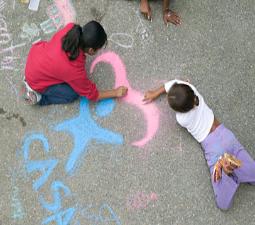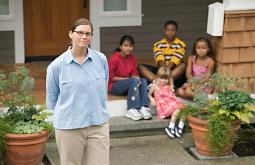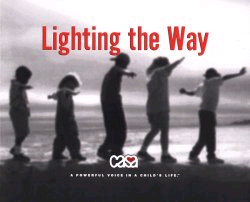| Housewifemafia.com |
| Submit Your Court Watch Findings and get the word out there! |
| HOUSEWIFEMAFIA.COM WILL PUBLISH THE REPORTS OF ALL COURT WATCH PROGRAMS IN THE U.S. Our goal is to have findings from all Court Watch programs in the United States readily available to all women and voters. |

| The eMagazine For Women |
| HouseWifeMaifa.com ~ The eMagazine For Women |
| 95% of children do not languish in long-term foster care. 90% of children do not reenter the child welfare system. |
In 1977, a Seattle judge conceived the idea of using trained
community volunteers to speak for the best interests of
abused and neglected children in court.
So successful was this program that soon judges across the country
began utilizing citizen advocates. In 1990, the US Congress
encouraged the expansion of CASA programs with passage of the
Victims of Child Abuse Act.
Today, CASA has grown to a network of more than 50,000 volunteers
that serve 225,000 abused and neglected children through 900 +
local program offices nationwide.
Advocates, also known as volunteer guardians ad litem in some
jurisdictions, are appointed members of the court.
Judges rely on the information these
trusted advocates present.
community volunteers to speak for the best interests of
abused and neglected children in court.
So successful was this program that soon judges across the country
began utilizing citizen advocates. In 1990, the US Congress
encouraged the expansion of CASA programs with passage of the
Victims of Child Abuse Act.
Today, CASA has grown to a network of more than 50,000 volunteers
that serve 225,000 abused and neglected children through 900 +
local program offices nationwide.
Advocates, also known as volunteer guardians ad litem in some
jurisdictions, are appointed members of the court.
Judges rely on the information these
trusted advocates present.
| Housewifemafia.com |
The mission of the National
Court Appointed Special
Advocate (CASA) Association,
together with its state and
local members, is to support
and promote court-appointed
volunteer advocacy for abused
and neglected children so that
they can thrive in safe,
permanent homes.
Court Appointed Special
Advocate (CASA) Association,
together with its state and
local members, is to support
and promote court-appointed
volunteer advocacy for abused
and neglected children so that
they can thrive in safe,
permanent homes.
| CASA's Goal by 2008 is to help an additional 100,000 children beyond those They already serve. This is just one step along the way to providing a CASA volunteer for every child who needs one. It is a very ambitious goal, and they cannot do it alone. |
| One day, CASA hopes to have a volunteer advocate for every child who needs one. |
| Today, there are more than 50,000 advocates serving in 948 state and local program offices nationwide. CASA programs across the country are known by several different names, including Guardian ad Litem, Child Advocates and Voices for Children. |
| Since the inception of CASA advocacy, volunteers have helped well over 1,000,000 children find safe, permanent homes in which they can thrive. |
Your local CASA program offers a
volunteer opportunity like no other.
As appointed representatives of the
court, CASA volunteers, also known
in some areas as volunteer
guardians ad litem (GALs), you are
empowered to make a lifelong
difference in the lives of abused
and neglected children.
volunteer opportunity like no other.
As appointed representatives of the
court, CASA volunteers, also known
in some areas as volunteer
guardians ad litem (GALs), you are
empowered to make a lifelong
difference in the lives of abused
and neglected children.
The Volunteer Commitment
In the work of child advocacy, we may spend half a day negotiating to see
that a child's special needs are met. We may make 14 phone calls in
search of an aunt who has not been heard from in six years. Or we may talk
to a parent who has made no progress with a rehab program. We may
become frustrated and angry and overwhelmed. But we do not stop. We do
not give up. This advocacy in all of its persistence, diligence and
commitment is what it takes for children to have a chance at a safe,
permanent home.
People who give their time to CASA advocacy come from many different
places. Some have years of education and professional experience
working for children and families. Some have themselves grown up in the
foster care system and felt the sorrow of having to move from home to
home. But most are ordinary people who flourished in a warm and loving
family, never once imagining that there were children who did not have
caring parents.
So what does it take to become a CASA volunteer?
After passing a background check and a 30-hour training course, our
volunteers average about 10 hours of service per month.
We also ask that volunteers dedicate themselves to a case until it is closed.
The average case lasts about a year and a half. Our advocates are
supervised every step of the way and always have resources readily
available.
Volunteer Commitment Top Ten List
In the work of child advocacy, we may spend half a day negotiating to see
that a child's special needs are met. We may make 14 phone calls in
search of an aunt who has not been heard from in six years. Or we may talk
to a parent who has made no progress with a rehab program. We may
become frustrated and angry and overwhelmed. But we do not stop. We do
not give up. This advocacy in all of its persistence, diligence and
commitment is what it takes for children to have a chance at a safe,
permanent home.
People who give their time to CASA advocacy come from many different
places. Some have years of education and professional experience
working for children and families. Some have themselves grown up in the
foster care system and felt the sorrow of having to move from home to
home. But most are ordinary people who flourished in a warm and loving
family, never once imagining that there were children who did not have
caring parents.
So what does it take to become a CASA volunteer?
After passing a background check and a 30-hour training course, our
volunteers average about 10 hours of service per month.
We also ask that volunteers dedicate themselves to a case until it is closed.
The average case lasts about a year and a half. Our advocates are
supervised every step of the way and always have resources readily
available.
Volunteer Commitment Top Ten List
There are so many unique and appealing
aspects to being a CASA volunteer.
For example, many Baby Boomers including me
have been in positions that are extremely
competitive. CASA allows you to have a lot of
influence without any of that. Anything you can do
benefits a child, rather than being used to get
ahead of someone else. That's incredibly refreshing.
Another thing that makes CASA different is how
self-directed the activity is.
You get to decide what would be the most
useful thing to do next. It's totally unlike being
handed a box of envelopes to stuff and then waiting
for the next box when you're done. You really use
your common sense and initiative.
Being a CASA volunteer has given me much more
understanding of the value of a stable family for
children—and new perspective on my own life of
relative privilege. This gives me an enormous
appreciation of the issues that people face.
Other than raising my own children, being a CASA
is the most valuable thing I've ever done.
Diana Farrow
Volunteer
King County Dependency (CASA) Program and
Retired Cancer Researcher
Seattle, WA
aspects to being a CASA volunteer.
For example, many Baby Boomers including me
have been in positions that are extremely
competitive. CASA allows you to have a lot of
influence without any of that. Anything you can do
benefits a child, rather than being used to get
ahead of someone else. That's incredibly refreshing.
Another thing that makes CASA different is how
self-directed the activity is.
You get to decide what would be the most
useful thing to do next. It's totally unlike being
handed a box of envelopes to stuff and then waiting
for the next box when you're done. You really use
your common sense and initiative.
Being a CASA volunteer has given me much more
understanding of the value of a stable family for
children—and new perspective on my own life of
relative privilege. This gives me an enormous
appreciation of the issues that people face.
Other than raising my own children, being a CASA
is the most valuable thing I've ever done.
Diana Farrow
Volunteer
King County Dependency (CASA) Program and
Retired Cancer Researcher
Seattle, WA



| All children deserve a safe, permanent home! Every year Colorado spends over $350 million on prisons, but less than $7 million on the prevention of abuse and neglect of children. A large percentage of the adults currently incarcerated were abused as children. Clearly, helping abused children today is the way to address many of societys problems tomorrow. Become part of one of the most prestigious volunteer activities in the nation and speak up for a child |






How CASA Volunteers Help
Foster Children
The benefits that a CASA volunteer
provides a foster child have been well
documented. A recent audit conducted
by the US Department of Justice Office
of the Inspector General demonstrates
that once a CASA volunteer is
assigned, approximately:
Foster Children
The benefits that a CASA volunteer
provides a foster child have been well
documented. A recent audit conducted
by the US Department of Justice Office
of the Inspector General demonstrates
that once a CASA volunteer is
assigned, approximately:
| Say What You Think. |

